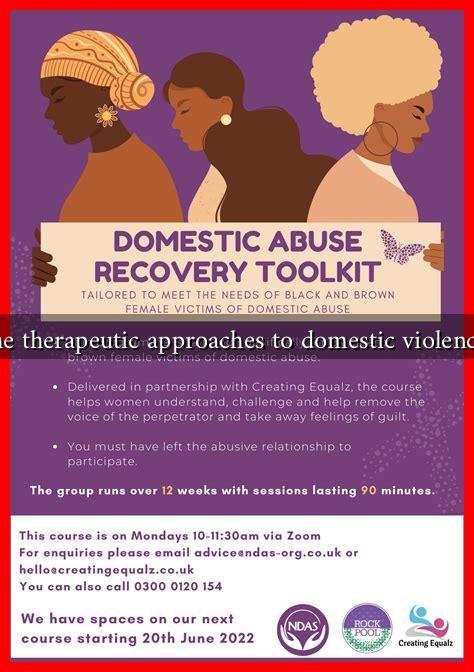-
Table of Contents
- What are the Therapeutic Approaches to Domestic Violence Recovery?
- Understanding the Impact of Domestic Violence
- Therapeutic Approaches to Recovery
- Cognitive Behavioral Therapy (CBT)
- Trauma-Informed Care
- Support Groups
- Mindfulness and Stress Reduction Techniques
- Case Study: A Survivor’s Journey
- Conclusion
What are the Therapeutic Approaches to Domestic Violence Recovery?
Domestic violence is a pervasive issue that affects millions of individuals worldwide, transcending age, gender, and socioeconomic status. Recovery from such trauma is a complex process that often requires a multifaceted therapeutic approach. This article explores various therapeutic methods that can aid in the recovery from domestic violence, providing insights into their effectiveness and application.
Understanding the Impact of Domestic Violence
Before delving into therapeutic approaches, it is essential to understand the profound impact of domestic violence on victims. Survivors often experience a range of psychological effects, including:
- Post-Traumatic Stress Disorder (PTSD)
- Depression and anxiety
- Low self-esteem
- Difficulty in forming relationships
- Substance abuse issues
According to the World Health Organization, approximately 1 in 3 women globally have experienced physical or sexual violence in their lifetime, highlighting the urgent need for effective recovery strategies.
Therapeutic Approaches to Recovery
Recovery from domestic violence is not a one-size-fits-all process. Various therapeutic approaches can be tailored to meet the unique needs of survivors. Here are some of the most effective methods:
Cognitive Behavioral Therapy (CBT)
CBT is a widely used therapeutic approach that helps individuals identify and change negative thought patterns and behaviors. For survivors of domestic violence, CBT can:
- Help in processing traumatic memories
- Teach coping strategies to manage anxiety and depression
- Encourage the development of healthier relationships
Case studies have shown that survivors who engage in CBT often report significant improvements in their mental health and overall well-being.
Trauma-Informed Care
Trauma-informed care is an approach that recognizes the widespread impact of trauma and emphasizes safety, empowerment, and healing. This method involves:
- Creating a safe environment for survivors
- Building trust and rapport between the therapist and the client
- Empowering survivors to make their own choices
Research indicates that trauma-informed care can lead to better engagement in therapy and improved outcomes for survivors.
Support Groups
Support groups provide a platform for survivors to share their experiences and connect with others who have faced similar challenges. Benefits of support groups include:
- Reducing feelings of isolation
- Providing emotional support and validation
- Offering practical advice and resources
Many survivors find that sharing their stories in a safe space helps them process their trauma and fosters a sense of community.
Mindfulness and Stress Reduction Techniques
Mindfulness practices, such as meditation and yoga, can be beneficial for survivors of domestic violence. These techniques help individuals:
- Reduce stress and anxiety
- Enhance emotional regulation
- Improve overall mental health
Studies have shown that mindfulness can lead to significant reductions in PTSD symptoms among trauma survivors.
Case Study: A Survivor’s Journey
Consider the case of Sarah, a 35-year-old woman who experienced years of emotional and physical abuse. After leaving her abusive partner, Sarah sought therapy and participated in a support group. Through CBT, she learned to challenge her negative thoughts and rebuild her self-esteem. Additionally, she practiced mindfulness techniques, which helped her manage anxiety. Over time, Sarah reported feeling more empowered and capable of forming healthy relationships.
Conclusion
Recovery from domestic violence is a challenging journey that requires a comprehensive therapeutic approach. Methods such as Cognitive Behavioral Therapy, trauma-informed care, support groups, and mindfulness practices can significantly aid survivors in their healing process. By understanding the impact of domestic violence and utilizing these therapeutic strategies, survivors can reclaim their lives and move towards a healthier future.
For more resources on domestic violence recovery, consider visiting the National Domestic Violence Hotline at thehotline.org.

